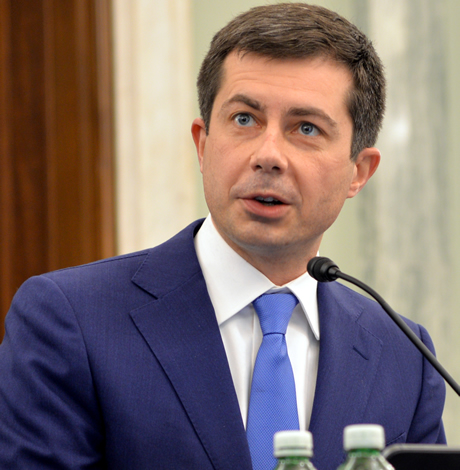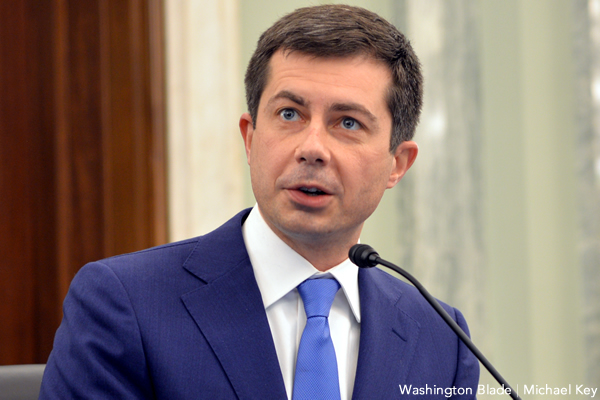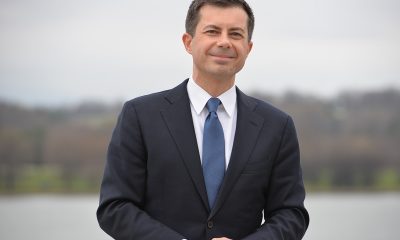Opinions
We need to live up to our inclusive standards and claims
Attacking Pete Buttigieg because he is white is unfair


I was born and raised in theocratic Iran, a country where the government denied my existence as a gay man. (Remember, “There are no gays in Iran.”) As a young gay boy coming of age in a conservative society and struggling with my sexual orientation, I was constantly bullied in high school. I was labeled the Farsi equivalents of a sissy and a f****t, and was an outsider with absolutely no friends. I didn’t see a future for myself as a gay man since I was pushed away and ostracized. I ached to belong to a group or community, but I didn’t belong to any. My family and relatives didn’t know the true me, and society didn’t want anything to do with someone like me. For a long time, I thought that I was the only person in the world who was gay. I never had an openly LGBTQ representation or role model to look up to and see myself in them, and I never thought I would see the day after tomorrow when “it will get better.” Those were lonely and dark times for me.
On Feb. 3, when Pete Buttigieg was sworn in as the youngest secretary of transportation and as the first openly LGBTQ Cabinet member in U.S. history, I was once again reminded of the necessity and power of representation. I find his selection and its positive consequences extremely important and thrilling. For the first time, an intelligent, successful, and hardworking person is representing our community in such a capacity on the national stage.
From the day Pete Buttigieg ran for the Democratic presidential nomination I’ve gotten into multiple arguments about him with several of my dear friends. These friends are very strong advocates for inclusivity and had the luxury of coming out to very understanding families and friends. Their coming of age as LGBTQ individuals was a smoother process, and they had many out role models and representations to look up to. However, they believe Secretary Buttigieg running as the first openly gay candidate for the highest office in the nation, and his confirmation as the first openly gay Cabinet member are not important. (Editor’s note: Fred Karger is the first openly gay man to run for president. He sought the Republican presidential nomination in 2012.) In fact, they find it shocking that a majority of the LGBTQ community is celebrating these milestones. Their arguments mostly revolve around the following two issues:
1) They believe he is not a good representative for the LGBTQ community because he lives a “heteronormative” lifestyle. They are using the same labeling mechanism that we reject as discriminatory, hateful and divisive against our community, to reject Secretary Buttigieg and his successes.
A) Who are we to judge others’ lifestyle and life choices? Isn’t that exactly the kind of judgement we as a community have suffered from for generations?
B) What is so heteronormative about a man who is married to another man anyway?! We claim to be a community of very diverse members. We have LGBTQ pastors, sex workers and everything in between. We have polyamorous open relationships, married monogamous couples with children and so much more in between. So why is it that suddenly Secretary Buttigieg doesn’t deserve to have a space on this wide spectrum that we call our LGBTQ family? He considers himself a cis man who doesn’t paint his nails but shares his last name with his husband. Why are his lifestyle and life choices and the individual that he is, fake and just a “show to get the support of as many straight and conservative people as possible?” Yet other lifestyle options in our family are genuine and real?
2) My friends believe Secretary Buttigieg’s achievements are not significant and not worthy of celebrating because they are the outcome of his “white privilege,” and “he doesn’t acknowledge or recognize that privilege enough.” They have decided to generalize against a portion of our community and based on that generalization punish some of the members of our LGBTQ family for who they are. In this case, it’s Secretary Buttigieg, who was born in a white family.
A) I don’t think it is right nor fair to attribute every single achievement of a white person completely to their white privilege. This is as wrong and misguided as is denying the existence of white privilege.
B) We know that white privilege exists. Secretary Buttigieg himself has acknowledged it many times in several interviews and public engagements, for example, in his April 2019 interview with Trevor Noah. What is the solution for white privilege? Is it to punish the people who were born into it and strip them off of their achievements, even though we cannot quantify how much of their success was due to white privilege? Should all white people publicly acknowledge their white privilege several times a day for us to forgive them? Or is the solution looking at their current actions and beliefs to see how they address the issue of white privilege, how they lift up people of color, and then holding them accountable?
C) It is not a mystery that almost all of the first doors in this country were opened by white people. On top of white privilege, and aside from the first doors that were opened by non-white people and in history were recorded for white individuals, white people are statistically still the single largest racial group in the U.S. (census.gov states more than 60 percent as of 2019.) So simply based on the rule of probability, white people are more likely to open more doors first. Yes, I wish a Black, brown or even olive LGBTQ person was the first openly LGBTQ member of the Cabinet. However, now that they are not, does this mean we should not acknowledge and celebrate the importance and significance of what Secretary Buttigieg has achieved? A door has been opened by a great individual, and this means that hopefully down the road many LGBTQ people of color will be able to follow him. As a marginalized community, any form of advancement for one of us is an advancement for the whole community and vice versa.
In my opinion, these negative attacks on Secretary Buttigieg are hypocritical and a double standard and are in no way helping or advancing any of our causes. We ask the larger society not to label or ostracize us, but then within our own community we do it so brazenly. Sadly, we are labeling ourselves out of the very inclusivity that we yearn for and claim to cherish.
We truly need to believe in inclusivity and commit to it. Adding letters and signs to “LGBTQ,” or adding colors to the rainbow flag or putting slogans on t-shirts are all beautiful for social media, but they do not do the work. We need to do the work, starting with ourselves.
Each of us has a story, and that story is valid. No one knows the details and corners of that story, but there is a lot more to us than what others see. Throwing a blanket on a group of people and treating them all the same comes from a very simplistic point of view and ignores the unique and valid story that each of us has. We need to be better than those we complain about.
For now, let’s wish the representative of our large and diverse family great success and celebrate what this means to younger LGBTQ people who live in not so friendly places around the country and around the world, and to those who at nights go to bed lonely and scared and in the morning wake up hopeless and sad.
Opinions
Supreme Court decision on opt outs for LGBTQ books in classrooms will likely accelerate censorship
Mahmoud v. Taylor ruling sets dangerous precedent

With its ruling Friday requiring public schools to allow parents to opt their children out of lessons with content they object to — in this case, picture books featuring LGBTQ+ characters or themes — the Supreme Court has opened up a new frontier for accelerating book-banning and censorship.
The legal case, Mahmoud v. Taylor, was brought by a group of elementary school parents in Montgomery County, Md., who objected to nine books with LGBTQ+ characters and themes. The books included stories about a girl whose uncle marries his partner, a child bullied because of his pink shoes, and a puppy that gets lost at a Pride parade. The parents, citing religious objections, sued the school district, arguing that they must be given the right to opt their children out of classroom lessons including such books. Though the district had originally offered this option, it reversed course when the policy proved unworkable.
In its opinion the court overruled the decisions of the lower courts and sided with the parents, ruling that books depicting a same-sex wedding as a happy occasion or treating a gay or transgender child as any other child were “designed to present … certain contrary values and beliefs as things to be rejected.” The court held that exposing children to lessons including these books was coercive, and undermined the parents’ religious beliefs in violation of the free exercise clause of the First Amendment.
This decision is the latest case in recent years to use religious freedom arguments to justify decisions that infringe on other fundamental rights. The court has used the Free Exercise Clause of the First Amendment to permit companies to deny their employees insurance coverage for birth control, allow state-contracted Catholic adoption agencies to refuse to work with same-sex couples, and permit other businesses to discriminate against customers on the basis of their sexual orientation.
Here, the court used the Free Exercise Clause to erode bedrock principles of the Free Speech Clause at a moment when free expression is in peril. Since 2021, PEN America has documented 16,000 instances of book bans nationwide. In addition, its tracking shows 62 state laws restricting teaching and learning on subjects from race and racism to LGBTQ+ rights and gender — censorship not seen since the Red Scare of the 1950s.
Forcing school districts to provide “opt outs” will likely accelerate book challenges and provide book banners with another tool to chill speech. School districts looking to avoid logistical burdens and controversy will simply remove these books, enacting de facto book bans that deny children the right to read. The court’s ruling, carefully couched in the language of religious freedom, did not even consider countervailing and fundamental free speech rights. And it will make even more vulnerable one of the main targets of those who have campaigned for book bans: LGBTQ+ stories.
When understood in this wider context, it is clear that this case is about more than religious liberty — it is also about ideological orthodoxy. Many of the opt-out requests in Montgomery County were not religious in nature. When the reversal of the opt-out policy was first announced, many parents voiced concerns that any references to sexual orientation and gender identity were age-inappropriate.
The decision could allow parents to suppress all kinds of ideas they might find objectionable. In her dissent, Justice Sotomayor cites examples of objections parents could have to books depicting patriotism, interfaith marriage, immodest dress, or women’s rights generally, including the achievements of women working outside the home. If parents can demand a right to opt their children out of any topic to which they hold religious objections, what is to stop them from challenging books featuring gender equality, single mothers, or even a cheeseburger, which someone could theoretically oppose for not being kosher? This case throws the door open to such possibilities.
But the decision will have an immediate and negative impact on the millions of LGBTQ+ students and teachers, and students being raised in families with same-sex parents. This decision stigmatizes LGBTQ+ stories, children, and families, undermines free expression and the right to read, and impairs the mission of our schools to prepare children to live in a diverse and pluralistic society.
Literature is a powerful tool for building empathy and understanding for everyone, and for ensuring that the rising generation is adequately prepared to thrive in a pluralistic society. When children don’t see themselves in books they are left to feel ostracized. When other children see only people like them they lose out on the opportunity to understand the world we live in and the people around them.
Advocates should not give up but instead take a page from the authors who have written books they wished they could have read when they were young — by uplifting their stories. Despite this devastating decision, we cannot allow their voices to be silenced. Rather, we should commit to upholding the right to read diverse literature.
Elly Brinkley is a staff attorney with PEN America.
Opinions
Pragmatic presidents invest in America
We need targeted, accountable investment in workforce stability

America may soon elect a president who identifies as LGBTQ. This possibility is no longer far-fetched, nor should it be alarming. What matters far more than who the president is, is whom the president serves.
In America, we care who the president loves because we want to know whether they love the people they represent. Not just the powerful or the visible, but those struggling to contribute more fully. The farmer in Iowa. The single mother in Ohio. The veteran in Houston who sleeps in his truck.
The moral test of any president is whether they recognize that a nation cannot call itself strong when millions of its people are locked out of participating in the economy. This is not sentiment. It is strategy.
We are heading toward a century of global competition where population, productivity, and workforce strength will decide which nations lead. The United States cannot afford to ignore the foundational truth that economic health begins with human stability. Without a well-fed, well-housed, well-prepared workforce, the American economy simply cannot compete.
Today, millions of Americans remain outside the labor force. According to the Bureau of Labor Statistics, roughly six million working-age Americans are not working or actively looking for work. Another 36.5 million live below the poverty line. Many of them lack the basic conditions required to contribute to our modern economy: shelter, nutrition, healthcare, or safety.
The result is predictable. A smaller workforce. Greater dependencies. Stagnant productivity. In 2024, the Congressional Budget Office projected a long-term decline in labor force participation unless structural barriers are addressed. This is not only an economic issue. It is a national security issue.
China and India are investing heavily in their own labor capacity. Meanwhile, we risk squandering ours. This is the backdrop against which the next president, whoever they are, must lead.
The role of government is not to provide individual comfort or cradle-to-grave care; that responsibility rightly belongs to families, communities, and civil society. Its role is to maintain the conditions necessary for every willing individual to contribute productively and invest with confidence. This means access to a safe home. It means access to basic nutrition. It means access to the building blocks of a productive life. Securing for our work forces what the Apostle Paul called diatrophas and skepasmata; or food and a place to sleep. These are not luxuries or favors. They are investments that yield growth in national capacity.
Too often these issues are framed in moral or ideological terms rather than pragmatic business interests. This rhetoric can mask poor planning, inefficiencies, and broken promises that leave communities worse off. Meanwhile these concerns go beyond common sense. They make business sense.
Consider housing. The National Low Income Housing Coalition reports a shortage of more than seven million affordable rental homes for extremely low-income households. This gap affects workforce mobility, job retention, and family stability. In cities with severe housing stress, employers cannot fill jobs because workers cannot live nearby.
Or take hunger. The USDA estimates that more than 47 million Americans live in food-insecure households. Children who are malnourished underperform in school. Adults who skip meals cannot stay focused on work. These are not abstract concerns. They are immediate threats to productivity and growth.
A president who understands this will not be swayed by ideology. They will ask: What strengthens our democracy? What builds a workforce that can out-innovate, out-produce, and out-lead our rivals?
The answer is not more bureaucracy. It is a targeted, accountable investment in workforce stability. Presidents should promote responsible public-private partnerships and remove barriers to full engagement. Communities need to strengthen local support and work with businesses on food, housing, and job training. Businesses recognize the returns on investments in workforce development and inclusive workplaces. Individuals should engage locally, build skills, and participate in practical solutions for community prosperity.
There is precedent. Conservative leaders have long understood that a stable society is a prerequisite for economic freedom. Abraham Lincoln supported land grants and public education. Dwight Eisenhower built the interstate system to connect markets and communities. Ronald Reagan expanded the Earned Income Tax Credit.
The next president should recognize these approaches. It is time to revive a governing vision that puts dignity at the heart of national strategy. That includes all Americans, from skilled professionals to warehouse workers, nurse’s aides, and long-haul truck drivers. Everyone has a responsibility to do their part to keep the economy moving.
This is where leadership matters. Not in posing as a cultural warrior, but in protecting our investments in the people who keep the nation running. A president who cares about this country will not ask what’s needed to make things easier. They will ask what’s needed to help us thrive together. They will help us choose the right way, the hard way, and maybe even the long way because building a competitive economy and a secure nation requires investing in the realities that make that happen.
If the next president can rise to that standard, then identity will matter far less than results. And maybe that is the clearest sign of progress yet.
Will Fries is a Maryland communications strategist with experience in multiple major presidential campaigns.
Opinions
We can’t afford Medicaid cuts in fight against HIV
A dangerous message about whose lives are deemed worth protecting

Right now, members of Congress are considering a budget proposal that would rip away life-saving health care coverage, particularly Medicaid from millions of people in the United States. This isn’t just unjust—it’s dangerous.
Since the late 1970s, there has been a strong push to advance the rights and well-being of LGBTQ+ elders, including the growing number of people aging with HIV. This community faces unique and often complex quality of life issues that require consistent, comprehensive care. Medicaid provides essential coverage for these services, including access to HIV medications, primary and specialist care, long-term care, and behavioral health support. Proposed cuts to Medicaid would destabilize this vital lifeline, threatening the health and dignity of one of the most medically vulnerable and historically marginalized communities in our country.
Congress is deciding just how deeply Medicaid could be cut. What’s at stake amounts to one of the most significant threats to public health in recent memory—one that would have a devastating impact on people aging with HIV.
The facts are clear: Medicaid is the single largest source of health care coverage for people living with HIV in the United States, covering roughly 4 in 10 people living with the disease. Many of those individuals are older people who rely on Medicaid not just for access to HIV treatments, but for managing other conditions that often accompany aging with HIV—such as cardiovascular disease, cognitive issues, and diabetes.
We have made remarkable progress in responding to HIV. Today, with effective treatment, people living with HIV can lead long, healthy lives. When HIV is suppressed to undetectable levels, it cannot be transmitted sexually. But this progress depends on consistent access to care. Without Medicaid, many people risk losing access to the medications that keep them healthy and alive—and that help prevent the transmission of HIV.
Moreover, Medicaid expansion has been directly associated with increased access to PrEP, a medication that is up to 99% effective at preventing HIV acquisition. Scaling back Medicaid would not only affect people already living and aging with HIV, but it would also limit preventive care that is essential to reducing new cases of HIV. In a world that too often dismisses older people as non-sexual and overlooks their need for HIV prevention services, the last thing we need is to further restrict access to sexual health services.
Older people with HIV often experience higher levels of isolation, stigma, and economic insecurity. They are more likely to be housing insecure and to have little to no family support. Medicaid helps older people maintain independence and age with dignity. Cutting Medicaid isn’t just a policy decision—it would create real hardship and suffering in the community.
Across the country, advocates and service providers see this reality every day. Countless LGBTQ+ elders and people aging with HIV rely on Medicaid for basic care and services. But that security can disappear quickly. That’s why taking action—right now—to help protect Medicaid is critical.
Here’s what you can do:
Call your members of Congress at 866-426-2631 and tell them “No cuts to Medicaid.”
Write your members of Congress and tell them that Medicaid must be protected for people aging with HIV. Our colleagues at AIDS United have created a simple and effective tool to help you reach your representatives directly.
Join the SAGE Action Squad. When you sign up, you’ll receive alerts and updates on urgent advocacy issues affecting LGBTQ+ elders and people aging with HIV. It’s a powerful way to stay informed and engaged—and to ensure your voice is part of this movement.
We understand that budget decisions are complex. But we also believe that protecting health care for the most vulnerable members in our community should never be negotiable. Cutting Medicaid doesn’t just reduce spending—it puts lives at risk. It creates new barriers for people aging with HIV to access care, manage their health, and live with dignity. It also limits critical prevention services for those vulnerable to acquiring HIV, undermining efforts to end the HIV epidemic.
If enough of us act, we can help stop these Medicaid cuts from happening. We can ensure that Medicaid continues to serve the people who need it most.
SAGE has been at the forefront of this fight for decades. We’ve helped secure victories in access, equity, and representation. But we can’t do it alone. We must come together to defend the programs that safeguard the health, dignity, and future of our community. Cutting Medicaid would not only roll back progress—it would deepen disparities, put lives at risk, and send a dangerous message about whose lives are deemed worth protecting. We must speak out and demand that our elected leaders prioritize care over cuts. Let’s protect Medicaid. Let’s protect people aging with, and vulnerable to, HIV. Let’s protect our community—and build a future where every older person with HIV can age with health, respect, and pride.
Terri L Wilder, MSW is the HIV/Aging Policy Advocate at SAGE where she implements the organization’s federal and state HIV/aging policy priorities.
-

 U.S. Supreme Court3 days ago
U.S. Supreme Court3 days agoSupreme Court upholds ACA rule that makes PrEP, other preventative care free
-

 U.S. Supreme Court3 days ago
U.S. Supreme Court3 days agoSupreme Court rules parents must have option to opt children out of LGBTQ-specific lessons
-

 India5 days ago
India5 days agoIndian court rules a transgender woman is a woman
-

 National4 days ago
National4 days agoEvan Wolfson on the 10-year legacy of marriage equality












